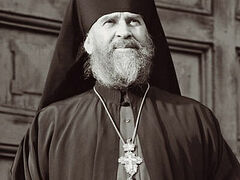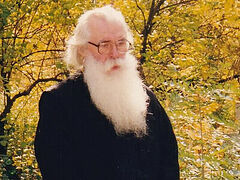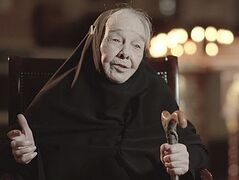—Natalia Ivanovna, tell us a few words about the ever-memorable Patriarch Alexei (Simansky).
—I remember that his voice was quiet and a little indistinct. He served beautifully and nobly, but his diction was a little unclear. We all understood him, but, of course, I cannot compare his voice with those of Patriarch Pimen (Izvekov) or Metropolitan Nicholai (Yarushevich). Theirs were already heard at the door: once an exclamation was given, everyone understood that they were serving.
And Patriarch Pimen (Izvekov) was our “daddy”—he was so dear to us. This was already in our time, not very long ago. He was not so old when he reposed and could have lived longer.
But look, how interesting: Pimen was Patriarch for almost twenty years, and Alexei II (Ridiger)—for almost twenty years as well. Such a coincidence!
And I knew them all because I went to churches. But, of course, not to all the churches of Moscow; I was at the Transfiguration Church in Transfiguration Square, at the Theophany Cathedral in Yelokhovo and here, at the Church of St. Elias in Obydensky Lane. These are all my churches...
Church porches were full of people and there were also crowds behind porches. During anointing the line would move gradually: some left, others entered church. “Please, vacate the space on the right side, let people come out and come in!” So we were anointed and then venerated the wonder-working icon—this would last an hour and a half.
The Church of St. Elias in Obydensky Lane is small. And its parishioners were mostly intellectuals. For example, there were doctors: the homeopaths Mukhin and Postnikov. A huge, handsome man... We would always exchange greetings with Vasily Vasilyevich Mukhin and Sergei Alekseevich Postnikov. Though ordinary secular people, they were in church every Sunday. Every Sunday without exception.
Sergei Alekseevich treated my dear mother—her heart and everything else. You know, in my age I don’t pay much attention to ailments and try to take everything easy. Whenever I am worried and unwell, I just say to my son: “Take me to church, I want to be there!” Today I was sitting in church again. As soon as I take Communion, I feel better.
Now many new people are appearing in the Church of St. Tryphon. Someone greets me, and I don’t even know who has greeted me. Countless multitudes of children come to church now, an enormous number of children!
When I got married, my husband was a front-line soldier and he went through two fronts. When he proposed to me, I said firmly: “I agree, but on condition that we will get married in church. Otherwise we will separate!”
There were no spiritual books at that time. But some nuns gave us akathist hymns: we had nuns at the Convent of the Nativity of the Mother of God, and my dear mother was in contact with them.
I worked, my husband worked, and we had no phones. The nuns called my mother, “our provider”; she would bring them sweets and bake them pancakes. And when my dear mother died, everyone said, “Oh, our provider has gone to the next world!”
And how the nuns buried her! You simply can’t imagine how many people came! Our tiny room was cramped, and some people even got up on the gas stove to bid farewell to my dear mother. They all already had secular jobs, but still they were nuns. Those who could come in time attended the funeral because many worked as janitors, nurses, etc. Maybe some were sent to us on purpose, who knows...
—Could you tell us how priests preached in church in your time? How did sermons of those years differ from those we hear today after services?
—The main point is that those sermons were very short. Not like now (as, for example, our father Feodor preaches, or as Metropolitan Job has preached today). Of course, there were no such long sermons in our time. If someone were to start saying something like that, they would immediately have been “caught by the tail” and arrested! They mostly spoke about the Gospel or the feast of the day—that’s all. Now, thank God, we have a lot of priests, and I am very grateful to God for this. Now the situation is completely different: they can give us various instructions, and we can approach them, consult and take their blessings... But then they were still afraid... And then there were no private confessions. And what could a priest say during a general confession? I was at those general confessions. It was during one of such confessions that I first met the future Patriarch Pimen. It was during his time as the Abbot of the Holy Trinity-St. Sergius Lavra (1954–1957). That man was a true miracle! He was so warm and sincere. He, the poor thing, could not say anything without tears. Sometimes tears welled up in his eyes when he began to speak,.
 Patriarch Pimen (Izvekov) Patriarch Pimen suffered much from ill health: His spine was broken because he had been at the front in WWII, and he wore a corset. He was very sick, hence his corpulence. He was a big man, but he was also corpulent. It was hard for him to bear this. My husband sometimes saw him home, as did my sister’s husband so it would be easier for him to walk.
Patriarch Pimen (Izvekov) Patriarch Pimen suffered much from ill health: His spine was broken because he had been at the front in WWII, and he wore a corset. He was very sick, hence his corpulence. He was a big man, but he was also corpulent. It was hard for him to bear this. My husband sometimes saw him home, as did my sister’s husband so it would be easier for him to walk.
When he was still a metropolitan, he often served in our St. Elias Church. He was very fond of the icon, “Unexpected Joy”, and every Friday he read akathists there.
—Do you remember the time when His Holiness Patriarch Pimen passed away?
—When Patriarch Pimen reposed, I cried a lot, I just sobbed. We were standing upstairs in the choir, and I was sobbing.
And when it was his last service, he could no longer walk—his legs were failing. He was taken out in a wheelchair. When I saw this, I burst into tears. And my sister, and two more women—we all just wept...
—Do you remember any other attributes of Patriarch Pimen?
—How beautifully he spoke! He and Metropolitan Nicholai (Yarushevich). We could listen to them day and night, day and night! Stand, listen—and you will never get tired! Without any purpose—we just loved to listen to them. We prayed as best we could. But the solemnity of services was extraordinary, and there were lots of people.
—Did the people who went to church feel fear, or did they fearlessly confess their faith?
—There were always a lot of people in church, but those who understood little perhaps were afraid. Now there is a sea of literature, people read a lot, and sermons can be given openly. Then those who were with God were never afraid. For example, we went to church without even thinking that they might stop us or something else. We just went to church—that’s all. At home I have a full-length icon of St. Seraphim of Sarov, which was an altar door. My dear mother found it in garbage. We came from Kiev, lived here for two years, and then my father died. And that’s why we remained here; otherwise we would have gone back to Kiev because my parents rented out an apartment there for ten years. We planned to live here for ten years and then return to Kiev. But my father died of appendicitis: he was hefty, but very shy. Appendicitis is a simple operation… And at night my mother was informed that Ivan Stepanovich had died. Of course, there was a sea of tears... I was five, and my sister was ten. Imagine: just two years since our arrival had passed. What can I say? My dear mother began to have frequent cardiac pains and fell regularly.
Fr. Alexander Zverev1 performed the funeral for my father. Few people seem to remember him now. Opposite the Convent of the Nativity of the Theotokos stands the Church of St. Nicholas in Zvonari, now the dependency of the Dormition Pukhtitsa Convent. And before that there was also St. Nicholas Church in Pushkary. I can’t say that I remember that church well—I was a young girl. I was sent to school when I was seven. And I went to the Church of St. Nicholas in Pushkary with my mother. And, of course, I remember St. Nicholas Church in Zvonari a little.
Fr. Alexander Zverev was another prominent archpriest. He had a daughter and a son. My older sister Nina was friends with Iraida, Fr. Alexander’s daughter. My dear mother was without a husband to help, and my sister was very weak and sick all the time. What could be arranged in the tiny room that we had? There was a chest, a bed and a small table. Everything else remained in Kiev.
—Natalia Ivanovna, what do you think awaits us today, in such a difficult time?
—We’re in God’s hands—what will be, will be! This is what I say to everyone. Did we know that there would be a war? We didn’t know—it just “fell” on the people, especially on Ukraine, on Kiev. At four in the morning the bombing began. The famous song was composed: “Kiev was bombed, we were announced that the war had begun…” Who could have known this? People had gone to sleep that night. It’s the same now: how do we know what awaits us? We don’t know anything! We are in the hands of God. And my mother always said to me: “Natochka, don’t bother about anything, my child! When you get up, just say: ‘Thank God, we are awake!’ When you go to bed, just ask, ‘Lord, bless us!’ That’s all...”
Recently we were at the Diveyevo Convent. I told my dear son: “Kolyusechka [a diminutive and affectionate form of the name Nikolai.—Trans.], if I live to see next summer, please take me to Diveyevo again! I want to walk along the Canal of the Mother of God again because it seems that I did it unworthily last time. I am afraid I prayed badly... The nuns told me that I should read the prayer, ‘Virgin Theotokos Rejoice’, 150 times, but I read it 180 times and badly as I was already hardly able to repeat it.”
—Can you mention something special that you felt at Diveyevo?
—It’s a miracle! A true wonder: whenever I am there, I don’t want to leave. I didn’t want to eat or drink anything. When I was embarking from Valaam Monastery, I cried: “I don’t want to leave this place! I don’t want to drink or eat, I just want to stay here!” It is these holy places that I miss.
—How can modern people be explained the concept of holiness, of the holy, and its beneficial effect on a person?
—I too think about it all the time, and sometimes others stop me. “Don’t bother! Don’t interfere! You won’t be able give anything if you don’t have it yourself!” I say to my son: “Kolya, we are Orthodox and we must guide them!”
—What can you wish and say to our readers in conclusion?
—I wish everyone spirituality, peace, love and understanding for each other. What more could one ask for? But spirituality comes first. If there is spirituality, there will be peace, calm, and silence. And, of course, there should be humility. And you need to go to church. People often say, “We just believe in God and don’t need the Church.” True, we are all believers—but we must go to church and listen to sermons. Listen to church singing. Singing! Even priests say: “Listen to church chants, listen to singing! What do you know? You know nothing because you don’t hear church singing...”





